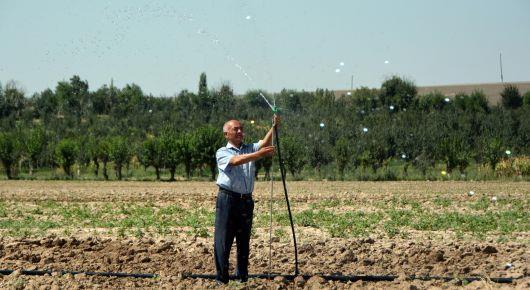Sustainability and biodiversity in Uzbekistan receives a strong boost from FAO and GEF

Uzbekistan is looking for ways to transform the management of its highly degraded landscapes, where globally important biodiversity coexists with production systems, under threat from overexploitation and agriculture intensification.
Wheat is one of the most essential food commodity in Uzbekistan. The country is a major producer and the biggest importer of the commodity in Central Asia. As present wheat production systems have a substantial environmental footprint, Uzbekistan specifically aims to scale up good practices and innovations for sustainable and inclusive wheat-based production landscapes and value chains, building on the help of FAO and its partners.
To this end, the Global Environment Facility (GEF) has approved to co-finance FAO’s efforts in Uzbekistan striving to shift food systems and land use to a sustainable track and supporting land restoration. Specifically, improvements in the wheat production and value chain are foreseen, given that the country is the sixth biggest wheat consumer in the world and that appetite is growing.
During a virtual meeting, the GEF Council agreed to cover USD 6.75 million out of a total budget of USD 71.23 million as part of the global “Food systems, land use and restoration impact program.” The rest will be funded by FAO and country partners.
As a result of the project, it is expected that by 2024 biodiversity will be enriched across all sectors and landscapes in Uzbekistan; food systems, land use, and restoration will improve and managed more effectively; and sustainable land management will prevail for the sake of agro-ecosystems.
“Protecting groundwater quality and quantity, currently under strong pressure, and other precious elements of the ecosystem will benefit not only the environment, but the wheat producer farmers and their families,” said Alisher Shukurov, Assistant FAO Representative to Uzbekistan. “As agriculture employs almost 60 percent of the rural population, this project can improve the lives of many.”
To this end, the project will promote improvements in the national legal, regulatory, and institutional frameworks, as well as, the adoption of incentives for using integrated land use management and climate-smart practices in wheat production.
A demonstration area of 350 000 hectares on irrigated and rain-fed productive landscapes should put sustainable principles in practice to provide first-hand experience on environmentally-friendly food production.
The rapid expansion of wheat production (volume has increased by almost six-fold over the past thirty years) came not only with environmental costs, but also revealed the gaps in the wheat value chain.
“It has become a priority for the Uzbek Government to restructure the wheat value chains by replacing state production targets and procurement prices with public grain stocks, and strengthening the role of private sector through linking the producers to markets,” said Aziz Nurbekov, FAO specialist on drought risk management.
The project aims to trigger wide-scale adoption of efficient land management technologies and conservation approaches, and promote green value chains to change the trajectory from ecosystem degradation to sustainable management with multiple benefits.
“Uzbekistan’s agriculture sector is undergoing a major transformation, with large investments going into wheat value chains. And the Government is keen to make this happen in a sustainable, inclusive, responsible way, to protect the environment and improve livelihoods, and ensure the long term resilience of production systems,” Nurbekov added.
FAO was selected to assist Uzbekistan in this undertaking following an open, competitive, and transparent process through the GEF’s call for proposals commissioned among 18 GEF agencies.
5 June 2020, Tashkent, Uzbekistan
